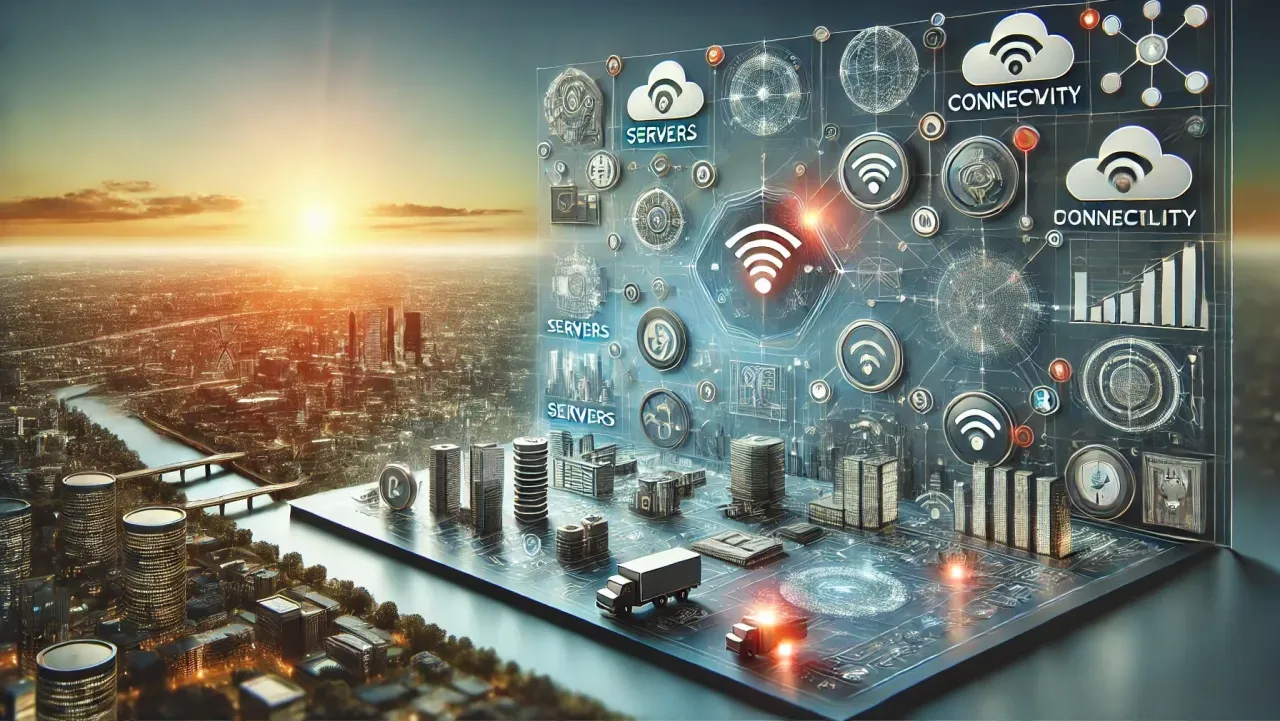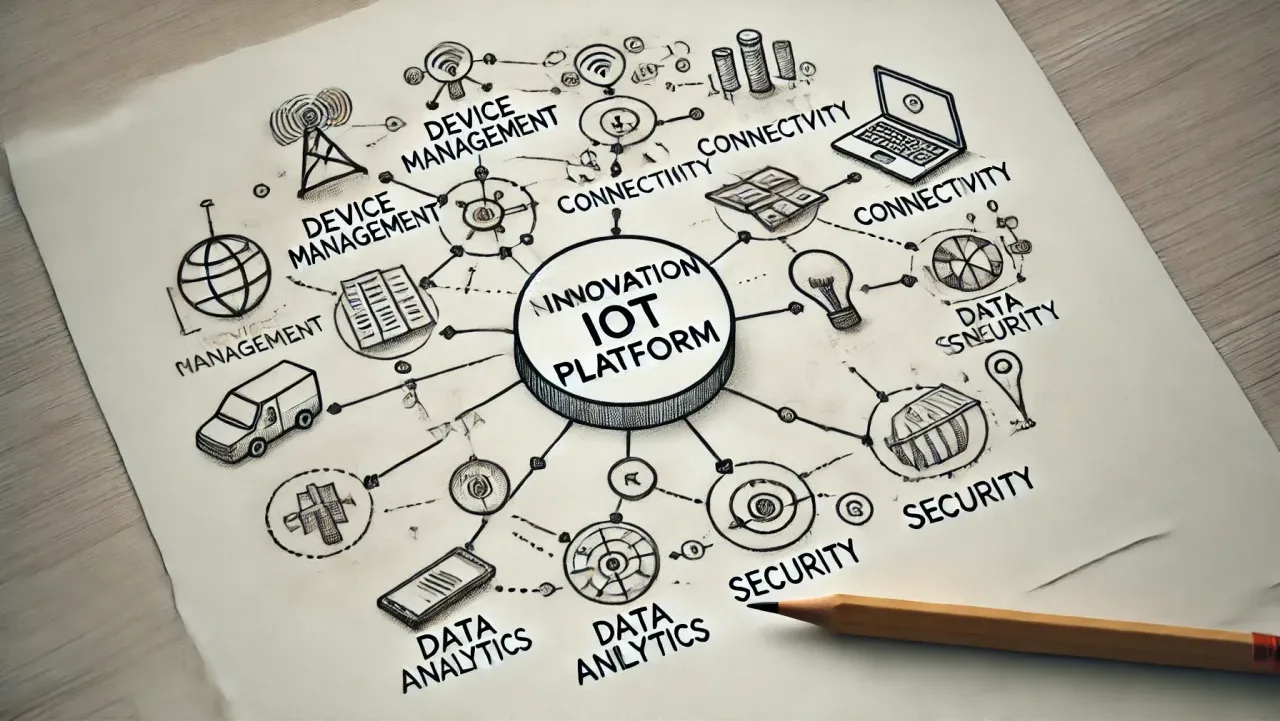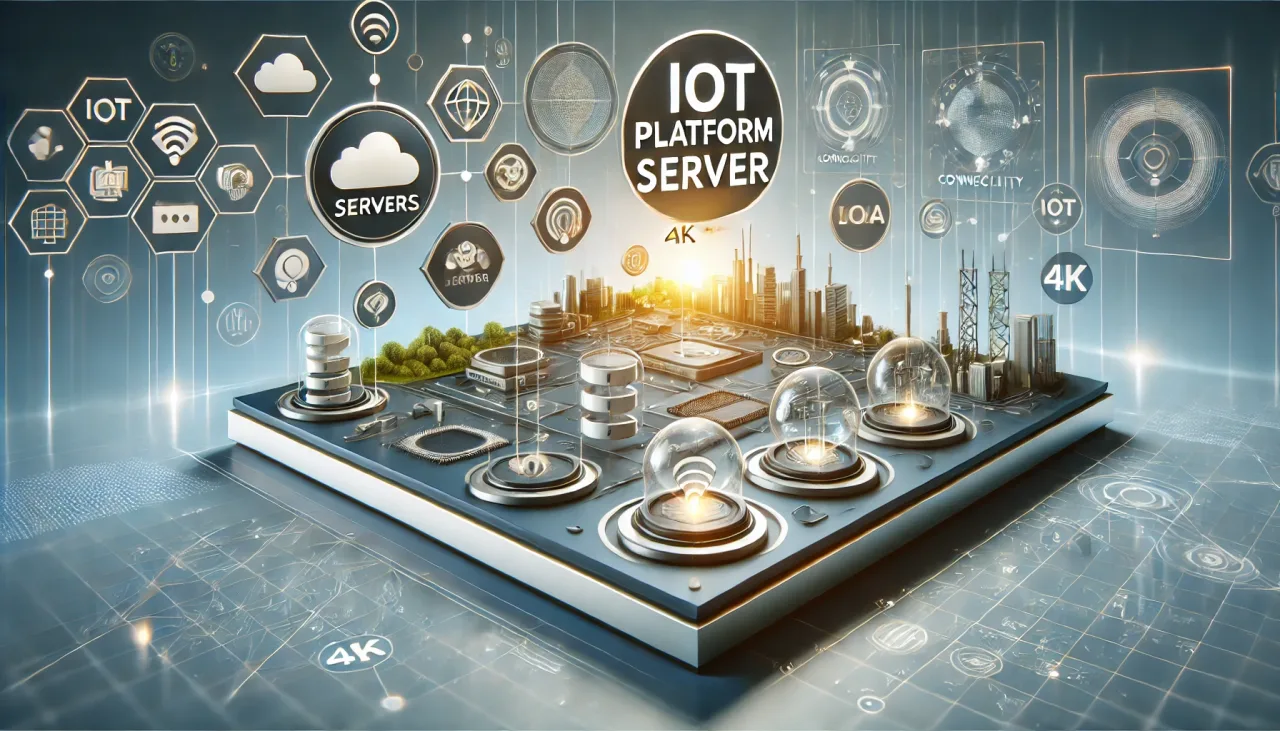In this Article
- Introduction to IoT Platform Server
- What is an IoT Platform Server?
- Definition of IoT Platform Server
- Understanding IoT Platform Server Basics
- Types of IoT Platform Servers
- Selecting the Right IoT Platform Server
- Benefits of Using IoT Platform Servers
- Streamlined Device Management
- Enhanced Connectivity
- Advanced Data Analytics
- Improved Security
- Leading IoT Platform Servers in the Market
- AWS IoT Core
- Microsoft Azure IoT Hub
- Google Cloud IoT Core
- IBM Watson IoT Platform
- Minnovation IoT Platform
- Reference
Introduction to IoT Platform Server
The Internet of Things (IoT) is revolutionizing the technological landscape, driving innovation across diverse sectors. From smart homes to industrial automation, IoT applications are transforming traditional systems into intelligent, interconnected networks. Understanding where IoT and IoT Platform Server solutions can be used and their top applications can help businesses and individuals harness their full potential. This comprehensive guide explores the top five applications of IoT and how they are reshaping different sectors. By leveraging IoT and IoT Platform Server solutions, companies can gain a competitive edge, improve operational efficiency, and deliver better products and services.
In the manufacturing sector, IoT enables predictive maintenance, reducing downtime and maintenance costs. Healthcare benefits from remote patient monitoring, leading to improved patient outcomes and reduced healthcare costs. The transportation industry uses IoT for fleet management and traffic optimization, enhancing safety and efficiency. Agriculture leverages IoT for precision farming, optimizing resource use and increasing crop yields. Retail employs IoT for inventory management and personalized customer experiences, driving sales and customer satisfaction. As IoT technology continues to evolve, its applications are expanding, creating new opportunities and addressing challenges across various industries.
What is an IoT Platform Server?
Definition of IoT Platform Server
An IoT platform server is a central hub that manages communication between IoT devices and the cloud. It provides the necessary infrastructure to connect, manage, and analyze data from IoT devices, facilitating seamless communication and data flow.
Key Components of IoT Platform Server
Device Management
- Provisioning: Ensuring devices are correctly configured and ready for deployment.
- Monitoring: Keeping track of device status and performance in real-time.
- Firmware Updates: Over-the-air updates to keep devices secure and functional.
Connectivity Management
- Protocols: Supporting various communication protocols like MQTT, CoAP, and HTTP.
- Network Management: Managing the network connections to ensure reliable data transmission.
- Bandwidth Optimization: Ensuring efficient use of network resources.
Data Management
- Data Collection: Gathering data from connected devices.
- Data Storage: Securely storing the collected data for analysis.
- Data Analytics: Using advanced analytics to derive insights from the data.
Security and Privacy
- Encryption: Ensuring data is encrypted during transmission and storage.
- Authentication: Verifying the identity of devices and users.
- Compliance: Adhering to regulatory standards and best practices for data privacy.
Application Enablement
- APIs: Providing APIs for integrating IoT data with other systems and applications.
- Development Tools: Offering tools for developing custom IoT applications.
- User Interfaces: Creating dashboards and interfaces for monitoring and managing IoT systems.
Understanding IoT Platform Server Basics
Types of IoT Platform Servers

Ai Image by Dall-E
- Device Management Servers: Focus on managing the lifecycle of IoT devices from deployment to decommissioning. Example: AWS IoT Device Management.
- Connectivity Servers: Facilitate communication between devices and the cloud. Example: Cisco IoT Cloud Connect.
- Data Management Servers: Specialize in collecting, storing, and analyzing IoT data. Example: Google Cloud IoT Core.
- Application Enablement Servers: Provide tools and frameworks for building IoT applications. Example: Microsoft Azure IoT Central.
- End-to-End IoT Servers: Offer comprehensive solutions covering device management, connectivity, data management, and application enablement. Example: IBM Watson IoT Platform.
Selecting the Right IoT Platform Server
Key Considerations
- Scalability: Ensure the platform server can scale with your growing number of devices and data volume.
- Security: Look for servers with robust security features to protect your data and devices.
- Integration: Consider how well the server integrates with your existing systems and other IoT solutions.
- Ease of Use: Choose a server with user-friendly interfaces and comprehensive support.
Benefits of Using IoT Platform Servers
Streamlined Device Management
IoT platform servers simplify the management of connected devices, providing tools for provisioning, monitoring, and updating devices remotely. This ensures that devices are always functioning optimally and securely.
Enhanced Connectivity
By supporting various communication protocols and managing network connections, IoT platform servers ensure reliable and efficient data transmission between devices and the cloud.
Advanced Data Analytics
IoT platform servers enable the collection and analysis of vast amounts of data, providing valuable insights that can drive business decisions and operational efficiencies.
Improved Security
Robust security features, including encryption, authentication, and compliance measures, protect data and devices from unauthorized access and cyber threats.
Leading IoT Platform Servers in the Market
AWS IoT Core
Overview of AWS IoT Core
AWS IoT Core is a managed cloud platform server that allows connected devices to interact with cloud applications and other devices easily and securely. It supports billions of devices and trillions of messages, ensuring reliable and scalable connectivity.
Key Features of AWS IoT Core
- Device Management: AWS IoT Device Management makes it easy to onboard, organize, monitor, and remotely manage IoT devices at scale.
- Secure Communication: AWS IoT Core ensures secure communication between devices and the cloud through TLS and mutual authentication.
- Real-Time Data Processing: AWS IoT Analytics enables real-time analysis of IoT data for actionable insights.
Use Cases for AWS IoT Core
- Smart Homes: Managing and controlling smart home devices such as thermostats, lighting systems, and security cameras.
- Industrial IoT: Monitoring and managing industrial equipment to improve operational efficiency and reduce downtime.
- Healthcare: Enabling remote patient monitoring and telehealth services to improve healthcare delivery.
Microsoft Azure IoT Hub
Overview of Microsoft Azure IoT Hub
Microsoft Azure IoT Hub is a cloud platform server that enables bi-directional communication between IoT applications and the devices they manage. It offers extensive security features and integration with other Azure services.
Key Features of Microsoft Azure IoT Hub
- Device Provisioning: Azure IoT Hub Device Provisioning Service simplifies the process of connecting and configuring devices securely.
- Edge Computing: Azure IoT Edge allows data processing and analytics at the edge, reducing latency and bandwidth usage.
- Integration: Seamless integration with other Azure services like Azure Machine Learning, Azure Functions, and Azure Stream Analytics.
Use Cases for Microsoft Azure IoT Hub
- Smart Cities: Implementing smart city solutions such as traffic management, waste management, and energy monitoring.
- Retail: Enhancing customer experiences through smart shelves, personalized offers, and inventory management.
Google Cloud IoT Core
Overview of Google Cloud IoT Core
Google Cloud IoT Core is a fully managed service that allows you to connect, manage, and ingest data from globally dispersed devices. It integrates with Google Cloud’s data analytics services to provide comprehensive IoT solutions.
Key Features of Google Cloud IoT Core
- Device Management: Supports large-scale device deployment and management with minimal effort.
- Real-Time Data Analysis: Integration with Google Cloud Pub/Sub, Dataflow, and BigQuery for real-time data analysis.
- Security: Ensures device security through mutual authentication and secure communication.
Use Cases for Google Cloud IoT Core
- Agriculture: Implementing precision agriculture techniques to optimize crop yields and resource usage.
- Healthcare: Enhancing patient care through remote monitoring and health data analytics.
- Manufacturing: Streamlining manufacturing processes through predictive maintenance and real-time monitoring.
IBM Watson IoT Platform
Overview of IBM Watson IoT Platform
IBM Watson IoT Platform provides powerful capabilities for device management, data collection, and real-time analytics. It leverages IBM’s cognitive computing and machine learning technologies to offer advanced IoT solutions.
Key Features of IBM Watson IoT Platform
- AI and Machine Learning: Integrates with IBM Watson services to provide AI-driven insights and automation.
- Device Connectivity: Supports a wide range of communication protocols for device connectivity.
- Advanced Analytics: Real-time analytics and visualization tools for monitoring and managing IoT data.
Use Cases for IBM Watson IoT Platform
- Manufacturing: Enhancing manufacturing processes through predictive maintenance and quality control.
- Energy Management: Optimizing energy consumption and distribution in smart grids and buildings.
- Transportation: Improving fleet management and logistics through real-time tracking and route optimization.
Minnovation IoT Platform
Overview of Minnovation IoT Platform

Ai Image by Dall-E
Minnovation specializes in providing comprehensive IoT solutions tailored to meet the unique needs of businesses. Their platform ensures seamless integration, robust security, and enhanced performance.
Key Features of Minnovation IoT Platform
- Custom Solutions: Tailored IoT solutions to fit specific business requirements.
- Robust Security: Advanced security features to protect data and devices.
- Scalable Architecture: Supports scalable deployments to accommodate growing IoT networks.
Use Cases for Minnovation IoT Platform
- Smart Cities: Implementing solutions for smart lighting, waste management, and traffic control.
- Industrial IoT: Enhancing industrial operations through predictive maintenance and remote monitoring.
- Healthcare: Providing advanced healthcare solutions through connected medical devices and remote monitoring.
Conclusion
Selecting the right IoT platform server is essential for optimizing IoT deployments and achieving business objectives. These servers act as the backbone of IoT infrastructure, ensuring seamless connectivity and data management. Understanding the common myths surrounding IoT platforms helps in making informed decisions. By recognizing what constitutes an IoT platform and what does not, businesses can better navigate the complex landscape of IoT solutions and leverage the right tools to drive innovation and efficiency. Investing in a robust IoT platform server can significantly enhance system reliability and performance, paving the way for future technological advancements.
How We Can Help
At Minnovation, we specialize in providing comprehensive IoT solutions tailored to meet the unique needs of your business. Our expertise in various IoT applications ensures seamless integration, robust security, and enhanced performance. We offer consultation, development, and management services to help you harness the full potential of IoT technology. Whether you are looking to implement a new IoT system or optimize your existing infrastructure, our team is here to support you every step of the way. For more details please visit our official website or Contact us.
Reference
Related Blog Posts
How Smart Cities Connect: Getting Started with Edge AI and IoT Technology
By Vamsi Krishna|June 24th, 2024|Categories: Articles, Smart Cities|Tags: edge AI, IoT technologies, smart cities connect, smart infrastructure, urban integration|
How to Get Started with Edge AI and IoT Technologies in Smart Cities: Overcoming Integration Challenges In recent years, the concept of smart cities has evolved from a futuristic Read More
5 Step Strategy: Ensuring Security and Privacy in 15-Minute Smart Cities
By Sanjeevan|June 23rd, 2024|Categories: Articles, Smart Cities|Tags: 15-minute smart cities, edge AI privacy, IoT Security, smart city security, urban tech|
Introduction Ensuring security and privacy in 15-minute smart cities is a critical challenge as urban areas become increasingly connected through IoT and edge AI technologies. These cities aim to Read More
What is a smart city and the challenge of legacy systems
By Sanjeevan|June 22nd, 2024|Categories: Articles, Smart Cities|Tags: legacy systems in smart cities, smart city infrastructure, smart city integration, smart city technology, what is a smart city|
How to Get Started with Integrating Legacy Systems in Smart Cities Smart cities are transforming urban landscapes by leveraging technology to improve the quality of life for residents. However, Read More




